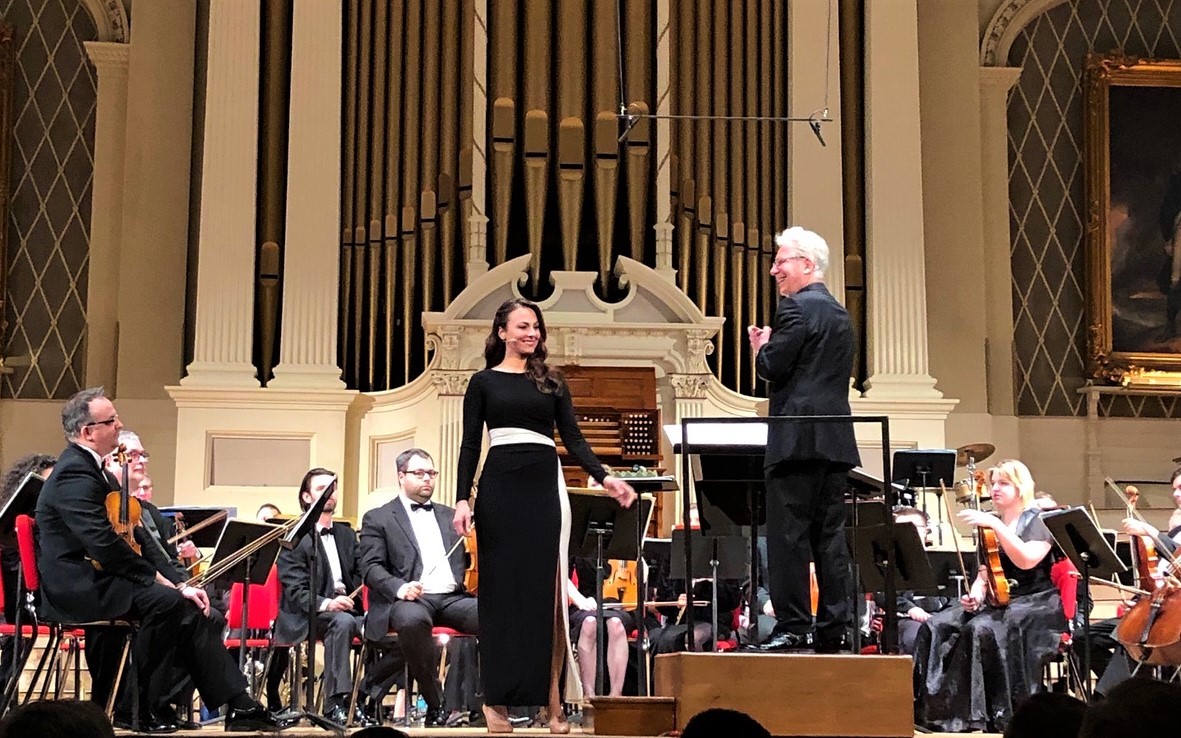Review: 100 YEARS OF BERNSTEIN: CZECH NATIONAL SYMPHONY, CONDUCTED BY JOHN MAUCERI, MEZZO SOPRANO, ISABEL LEONARD at Tilles Center, CW POST University
 When my friend, tenor Mario Frangoulis, called me and asked if I wanted to go hear a concert of Leonard Bernstein music out at CW Post College in Long Island, my initial reaction was that I'd rather stick needles in my ears than sit through yet another Bernstein celebration concert. Ok, full disclosure, in the past 18 months or so, I've attended more than a dozen such concerts, recitals, ballets, etc. (including several readings of my own new play "Herb & Lenny", about the final meeting between Bernstein and Von Karajan). I adore Bernstein, and I consider him one of the great geniuses of the 20th century, but there's only so much one can take - right?
When my friend, tenor Mario Frangoulis, called me and asked if I wanted to go hear a concert of Leonard Bernstein music out at CW Post College in Long Island, my initial reaction was that I'd rather stick needles in my ears than sit through yet another Bernstein celebration concert. Ok, full disclosure, in the past 18 months or so, I've attended more than a dozen such concerts, recitals, ballets, etc. (including several readings of my own new play "Herb & Lenny", about the final meeting between Bernstein and Von Karajan). I adore Bernstein, and I consider him one of the great geniuses of the 20th century, but there's only so much one can take - right?
I was wrong.
The Czech National Symphony Orchestra, under the baton of conductor John Mauceri, and featuring special guest, mezzo-soprano Isabel Leonard delivered a performance that was fun, fresh and full of interesting chestnuts and delightful anecdotes about Lenny from someone who knew him about as well as anyone. John Mauceri's resume is long and legendary. As one of Bernstein's close friends and students, his understanding of every imaginable nuance in the master's music was clear from the start. He was the conductor of the World Premiere of Bernstein's "A Quiet Place" (which interestingly enough was nowhere on the program - too obvious a choice? Perhaps.)
"100 Years of Leonard Bernstein" featured a healthy helping of popular numbers - "The Candide Overture," "Somewhere," from "West Side Story" - but the real joy of the program was the lesser known (and lesser-performed) numbers. Actually, in truth, virtually nothing in the Bernstein canon has flown completely under the radar, especially in this centennial year. However, under the baton of Mauceri, the program was guaranteed to feature more than simply the most obvious selections. The opening "Musical Toast! Happy Birthday Lenny!" was a lot of fun and set the stage for a playful and satisfying program.
"Meditation No. 3" from 1971's "Mass" followed and principal cellist Jan Pospisil took center stage. Full disclosure, "Mass" is not a favorite of this critic and the "Meditations" have been particularly problematic. Candidly speaking, I cannot tell a good performance of them from a bad one, so the most honest statement I can make is to say the orchestra played with great passion and Mr. Pospisil gave an earnest and vigorous rendition.

When Isabel Leonard took the stage, the performance moved to another level. Ms. Leonard has been critically acclaimed for her performances of Bernstein's music for some time now and it's readily apparent why. Her warm mezzo and broad vocal range is vocally ideal for these selections, but more to the point, Ms. Leonard "gets" this music. Her delivery is beautifully nuanced without being at all fussy. And the program featured an uber-eclectic blend of song to really put her through her paces. Bernstein composed The "Piccola Serenata" on the occasion of Maestro Karl Boehm's eighty-fifth birthday in 1979, and the words: "Da ga da ga dum da lai la lo" never sounded quite as lovely as when delivered by Ms. Leonard in her best quasi-Hebraic accent.
The nonsensical fun of the "Piccolo Serenata" was followed by one of Bernstein's most serious songs, 1968's "So Pretty." Adolph Green and Betty Comden provided the lyrics for what was Lenny's only protest song. The song premiered at the "Broadway for Peace" benefit concert and was sung by no less than Barbra Streisand. Ms. Leonard moved from the light fare of the serenata to the somber protest song effortlessly (and once again delivered some eye-rolling lyrics - "I had to ask my teacher why war was making all those people die" - earnestly and with great pathos).
"Silhouette," her final selection from the first half of the program, was another piece composed for a friend's birthday: Jennie Tourel. The song is loosely based on an old Lebanese folksong, and once again Ms. Leonard displayed not merely a command of language, but a deep rhythmic fluency as the song bounced back and forth between 5/8 and 3/4 time from measure to measure.
Note: This brief collection of three early songs. while light and simple on the surface, could not be more dissimilar and starkly contrasting in styles. Kudos to Mr. Mauceri and Ms. Leonard for a small masterpiece of programming.

The first half concluded with the "1600 Pennsylvania Avenue Concert Suite." The expression "ill-fated" regarding this show has been done to death, so I'll just say, I never saw the show, however, the musical suite collected from its songs is absolutely delightful and Mr. Mauceri appeared to pass into another sphere of consciousness while he conducted it.
The second half began with a lively, spirited reading of the "Candide Overture" - always a crowd pleaser. Mr. Mauceri's connection to the piece is long and well known, and his depth interpretation of the work is second to none.
Ms. Leonard returned with an absolutely ravishing rendition of "Dream With Me" from "Peter Pan." Can you believe this song was cut, first from "On The Town" then from "Peter Pan"??? What were they thinking? The audience was literally, gently rocking back and forth as Ms. Leonard's velvety voice poured out over them - like a mother singing a lullaby to her children.
The dream came to an abrupt hault with the next selection: "What a Movie!" from "Trouble in Tahiti." The number deals with the opera's heroine Dinah pining for a deep and meaningful love like the one in a low-budget movie she's just seen. Ironically, Bernstein was on his honeymoon when he wrote the piece! The ability to handle multiple changes of rhythm, bizarre interval leaps and sharply contrasting styles - delivered with impeccable comic time - is required to make this song work. Far too frequently it becomes just plain over-the-top silliness, instead of the tour-de-force that it really is. Luckily Ms. Leonard possesses all the former qualities in abundance and her take on the song was brilliantly understated - one moment droll and the next uproarious. Anyone who has seen her Rosina in "Barbiere" can attest to her ability to handle opera buffa, but in the Bernstein material she has shown herself as capable of much more sophisticated and nuanced comic stylings.
Her last number in the program was "Take Care of This House" from "1600." The song has taken on new significance in this troubled time in our history. The song's metaphorical images have never been more clear. Ms. Leonard's delivery was solemn and almost mournful, delicately building in intensity and finally appearing on the verge of tears as she pronounced the final line: "Be always on call, for this house is the house of us all."
The program's final selection was the "Symphonic Dances" from "West Side Story" (didn't think you could get away without ANY "West Side Story," did you? Mr. Mauceri reveled in the piece taking broad tempi and pulling forward some usually unheard colors from the orchestra. It was lovely - if a bit perfunctory.
Ms. Leonard appeared for two encores, the first of which Mr. Mauceri dedicated to his high school guidance counselor, Mrs. Healy, who was in attendance! Leonard performed the wistful "Some Other Time," from "On The Town" for Mrs. Healy and there was hardly a dry eye in the house. The final encore was "Somewhere," which was certainly a fitting capstone on a wonderful program. - Peter Danish, Classical Editor
Videos
.png)
